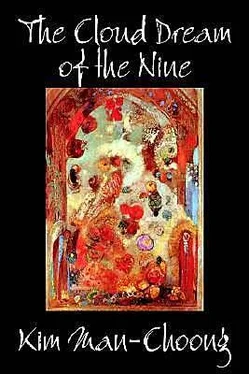Kim ManChoong - The Cloud Dream of the Nine
Здесь есть возможность читать онлайн «Kim ManChoong - The Cloud Dream of the Nine» весь текст электронной книги совершенно бесплатно (целиком полную версию без сокращений). В некоторых случаях можно слушать аудио, скачать через торрент в формате fb2 и присутствует краткое содержание. Жанр: Старинная литература, на русском языке. Описание произведения, (предисловие) а так же отзывы посетителей доступны на портале библиотеки ЛибКат.
- Название:The Cloud Dream of the Nine
- Автор:
- Жанр:
- Год:неизвестен
- ISBN:нет данных
- Рейтинг книги:5 / 5. Голосов: 1
-
Избранное:Добавить в избранное
- Отзывы:
-
Ваша оценка:
- 100
- 1
- 2
- 3
- 4
- 5
The Cloud Dream of the Nine: краткое содержание, описание и аннотация
Предлагаем к чтению аннотацию, описание, краткое содержание или предисловие (зависит от того, что написал сам автор книги «The Cloud Dream of the Nine»). Если вы не нашли необходимую информацию о книге — напишите в комментариях, мы постараемся отыскать её.
The Cloud Dream of the Nine — читать онлайн бесплатно полную книгу (весь текст) целиком
Ниже представлен текст книги, разбитый по страницам. Система сохранения места последней прочитанной страницы, позволяет с удобством читать онлайн бесплатно книгу «The Cloud Dream of the Nine», без необходимости каждый раз заново искать на чём Вы остановились. Поставьте закладку, и сможете в любой момент перейти на страницу, на которой закончили чтение.
Интервал:
Закладка:
So he issued a proclamation making the Master the honorary Chief of the Literati, and appointing to him five thousand extra homes to exalt his rank, while he relieved him of all the arduous duties of active office.
Chapter XVIThe Answer: Back to the Buddha
THE Master was exceedingly grateful for this Imperial favour and bowed low and gave thanks. He then removed his whole household to Green Mountain Castle, which was among the hills to the south of the city. The towers were all in good repair and the views from their tops, beautiful beyond comparison, were like the fairy vistas of the Pong-nai Hills.
The main hall was empty and there he placed the Imperial rescripts and orders. In the inner pavilion he made the two Princesses live and the six sisters. Day by day in company with his household he visited the groves and streams, enjoyed the light of the moon, or went into the valleys to seek cherry blossoms. There they wrote verses as they sat under the shade of the pines, or played on the harp, so that all who knew of it spoke with admiration of their happy old age.
Desiring quiet, the Master no longer saw guests or callers.
On the 16th of the 8th Moon, which was his birthday, a great feast was held at which all the members of his clan were present. It lasted for ten days, during which time the whole place was astir. When it was over and quiet had returned, the retired mode of life was resumed.
A little later came the 9th Moon, when the buds of the chrysanthemum began to open and the so-yoo berries bloomed red on the high peaks and ledges of the hills.
To the west of Green Mountain Castle was a high tower from which a view of the Chin River was to be had, stretching a hundred miles, silvery and clear in its long expanse of water. The Master greatly enjoyed this view, and one day he took the two Princesses and the six ladies with him to the top. Each had a wreath of chrysanthemum flowers encircling her brow, and as they looked off over the autumn valleys they passed the glass together. Suddenly the descending sun cast a shadow from the neighbouring peak that ran a shaft of darkness over the wide stretch of plain. The Master drew forth his green stone flute and began to play. The tune was one plaintive beyond expression, as though heaped-up sorrows and hidden tears had broken forth upon them. The ladies' hearts were overcome with sadness, joy departed, and deep, long shadows closed down upon the soul.
The two Princesses asked “Your Excellency has won everything in the way of honour and fame. You are rich in goods that you have long enjoyed, with which the world blesses you—something but rarely seen. When you are so happily circumstanced, with a beautiful world outstretched before you, and the golden flowers dropping their petals at your feet, why should you suggest sadness and sorrow? With our loving hearts around you, too, what more could you have of what the world calls happiness? The notes of your flute break our hearts and cause our tears to flow. You never did this before; what does it mean, pray?”
Then the Master threw away the flute, drew aside, and resting on the railing of the balcony, pointed to the darkening landscape and said: “When I look north a stretch of level country greets me as far as the eye can see; one dismantled hill-top only breaks the view. The falling light of the evening permits me to see indistinctly amid the long grass the ruined A-bang Palace where dwelt the Emperor Chin-see. When I look west the lonely winds rustle the dry reeds of the evening as the mists crown the hill over the deserted tomb of Moo-jee of Han, As I look east, a white wall encircles a hill, and a red-tiled palace rises skyward over which the moon now casts its beams. The marble railings show no one resting on them, for it is the long-vacated palace of Hyon-jong, where he dallied his days away with the famous woman Yang Kwi-pee. Alas, these were all kings of great renown, who made their gates of the surrounding sea, and their court of the far-stretching world. All the people were their subjects, and were at their service as courtiers or mistresses. Their mighty powers and talents were enlisted in search of the eternal Pong-nai Hills where they might enjoy unending bliss for ever.
“I, So-yoo, in my boyhood was a poor scholar, but I have been blessed with enduring favours from his Majesty, and elevated to the highest rank. The members of my household have lived together in sweetness and accord till this time of old age. If it had not been for the affinity of a former existence, how could this have been? By reason of this mysterious bond it has all come to pass. When the term fixed for this mortal life is completed, we must part; and when once death has swept us away, even this lofty tower shall fall and the fair lake beneath us shall be dried up. This palace hall, where to-day is music and dancing, will be overgrown with grass and the mists will cover it. Children who gather wood or feed their cattle on the hillside will sing their songs and tell our mournful story, saying: 'This is where Master Yang made merry with his wives and family. All his honours and delights, all the pretty faces of his ladies, are gone for ever.'
“The boy who gathers wood and the lad who cares for the cattle will look upon this place of ours just as I look upon the palace and tomb of the kings that have gone before us. When I think of it, a man's life is only the span of a moment after all.
“There are three religions on earth, Confucianism, Taoism, and Buddhism. Among the three, Buddhism is the most spiritual; Confucianism deals with terrestrial matters and has to do with the duties of man to man. It helps to pass on names to posterity. Taoism is related to the misty and unknown, and though it has many followers there is no proof of its verity.
“Since I gave up office I have dreamed of meditation before the Buddha. This is proof of my affinity with the God. Just as Chang Cha-pang [46]
followed Chok Song-ja, the fairy, I, too, must say farewell to my home and go to the distant shore, there to seek the Merciful Buddha, ascend the Sacred Hall, and bow low before his image. The Way that has no birth and no death beckons to me and puts off all the sorrows of life. To you with whom I have spent so many happy days I must say a long farewell, and so my sorrow and loss is expressed by the sad notes of the green stone flute.”
The ladies in their former existence had been the eight fairies who lived on Nam-ak Mountain. Now they had fulfilled their human affinity, and hearing the Master's word they were moved by it and said each to the other: “In the midst of all his affluence the Master's speech is evidently at the command of God, We eight sisters who have lived our life in these inner quarters and have bowed night and morning before the Buddha shall await the departure of our lord. When he goes he will assuredly meet the Enlightened One and the righteous friends who have gone before him and will hear the words of life. Our humble wish is that after he has attained he may be pleased to teach us the way.”
The Master, greatly delighted, said: “Since your hearts are one with mine in this you need have no fear. I start to-morrow.”
The ladies all said: “We shall each raise the glass that wishes you great peace on the eternal way.”
Just at the moment when they had given orders to the serving maids to bring the glasses, the fall of a staff was heard on the stone pavement beyond the open balcony. They exclaimed: “Who has come, I wonder?”
Immediately an old priest appeared before them with eyebrows an ell long and eyes like the waves of the blue sea. His appearance and his behaviour were mysterious and wonderful. He ascended the tower, sat down before the Master, and said: “A dweller from the hills seeks audience with your Excellency.”
Читать дальшеИнтервал:
Закладка:
Похожие книги на «The Cloud Dream of the Nine»
Представляем Вашему вниманию похожие книги на «The Cloud Dream of the Nine» списком для выбора. Мы отобрали схожую по названию и смыслу литературу в надежде предоставить читателям больше вариантов отыскать новые, интересные, ещё непрочитанные произведения.
Обсуждение, отзывы о книге «The Cloud Dream of the Nine» и просто собственные мнения читателей. Оставьте ваши комментарии, напишите, что Вы думаете о произведении, его смысле или главных героях. Укажите что конкретно понравилось, а что нет, и почему Вы так считаете.












